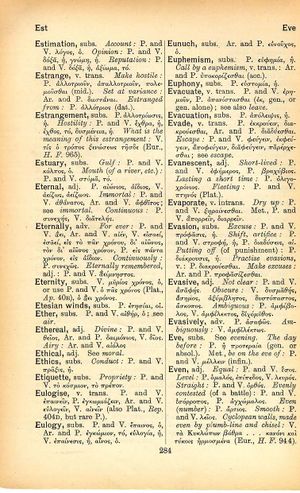estrangement: Difference between revisions
From LSJ
ὁ γὰρ ἀποθανὼν δεδικαίωται ἀπὸ τῆς ἁμαρτίας → anyone who has died has been set free from sin, the person who has died has been freed from sin, someone who has died has been freed from sin (Romans 6:7)
(CSV4) |
m (Woodhouse1 replacement) |
||
| Line 1: | Line 1: | ||
{{Woodhouse1 | {{Woodhouse1 | ||
|Text=[[File:woodhouse_284.jpg|thumb|link={{filepath:woodhouse_284.jpg}}]] | |Text=[[File:woodhouse_284.jpg|thumb|link={{filepath:woodhouse_284.jpg}}]] | ||
P. [[ἀλλοτρίωσις]], ἡ. | ===substantive=== | ||
[[prose|P.]] [[ἀλλοτρίωσις]], ἡ. | |||
[[hostility]]: [[prose|P.]] and [[verse|V.]] [[ἔχθρα]], ἡ, [[ἔχθος]], τό, [[δυσμένεια]], ἡ. | |||
[[what is the meaning of this estrangement]]: [[verse|V.]] [[τίς ὁ τρόπος ξενώσεως τῆσδε]] ([[Euripides|Eur.]], ''[[Hercules Furens]]'' 965). | |||
}} | }} | ||
Revision as of 08:56, 20 May 2020
English > Greek (Woodhouse)
substantive
P. ἀλλοτρίωσις, ἡ.
hostility: P. and V. ἔχθρα, ἡ, ἔχθος, τό, δυσμένεια, ἡ.
what is the meaning of this estrangement: V. τίς ὁ τρόπος ξενώσεως τῆσδε (Eur., Hercules Furens 965).

